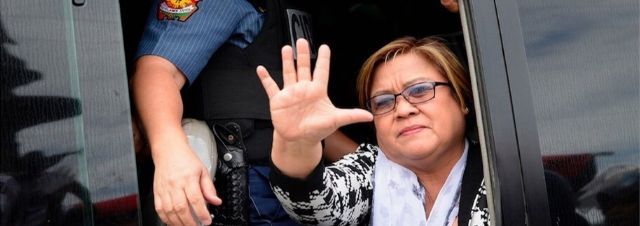 Philippine Senator Leila de Lima, a human rights lawyer and an elected member of the Philippine Senate, has been denied visitors since 25 April as part of preventive measures against the COVID-19. She was also prevented from communicating with the outside world between 5 May and 27 May. Several requests have been made by Senator de Lima’s staff and by the Senator herself to the Custodial Center administration in order to exempt her from these measures, given her status as a working legislator and the conditions at the PNP Custodial Center, which is not congested and where social distancing measures can be implemented. However, all requests have been rejected.
Philippine Senator Leila de Lima, a human rights lawyer and an elected member of the Philippine Senate, has been denied visitors since 25 April as part of preventive measures against the COVID-19. She was also prevented from communicating with the outside world between 5 May and 27 May. Several requests have been made by Senator de Lima’s staff and by the Senator herself to the Custodial Center administration in order to exempt her from these measures, given her status as a working legislator and the conditions at the PNP Custodial Center, which is not congested and where social distancing measures can be implemented. However, all requests have been rejected.
In another worrying incident, which illustrates the situation of defenders in the country we have received with concern reliable information about the sentencing of Ms. Maria Ressa, founder and Executive Editor of the news website Rappler, and Mr. Reynaldo Santos Jr., a former Rappler researcher. Rappler is an online news outlet known for its investigative reporting and its criticism of the Duterte administration’s actions, especially of the extra-judicial killings committed as part of Duterte’s “war on drugs”. In a retroactive application of the Cybercrime Prevention Act of 2012, Ms. Maria Ressa and Mr. Reynaldo Santos were sentenced to an indeterminate prison sentence ranging from six months and one day to six years. Both defenders were fined 200,000 PHP (about 3,585 EUR) for moral damages and another 200,000 PHP for exemplary damages. Ms. Maria Ressa and Mr. Reynaldo Santos Jr. were allowed to post bail pending the appeal. The sentencing of Ms. Maria Ressa and Mr. Reynaldo Santos occurs in the context of a systematic campaign of criminalization and intimidation against the news media Rappler that started following President Duterte’s state of the nation address on July 24, 2017. During his speech, President Duterte accused Rappler and the broadcast media company ABS-CBN of being “fully owned by Americans”, in violation of laws restricting foreign ownership of mass media.
The Philippines currently ranks 136 in the 2020 World Press Freedom Index. When sworn in as president in June 2016, Rodrigo Duterte issued this cryptic but grim warning: “Just because you’re a journalist, you are not exempted from assassination, if you’re a son of a bitch. Freedom of expression cannot help you if you have done something wrong.” Three Philippine journalists were killed in 2019, probably by thugs working for local politicians, who can have reporters silenced with complete impunity. Meanwhile, after a ten-year wait, leading members of the Ampatuan political clan were finally convicted in December 2019 of carrying out the biggest ever massacre of journalists – on the island of Mindanao in 2009. The government, for its part, has developed several ways to pressure journalists who dare to be overly critical of the summary methods adopted by “Punisher” Duterte and his “war on drugs.”


